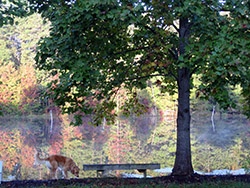In communities that have many homes centered on a lake or pond, any open space in which a dog can roam is seen as a luxury. In no time at all, these open spaces can become very concentrated with dog droppings. Due to diet, dog feces do not break down as fast as wild animal feces and can begin to accumulate very quickly. And when there is a large concentration of this stuff in one place and it rains, stormwater runoff allows it to easily flow directly into a lake, pond or other waterbody. This is a health concern for humans as well as other organisms that might come in contact the water. E. coli, giardia, and salmonella are just a few of the bacteria found in dog feces, and parasites such as roundworms, hookworms, and cryptosporidium are also present. All of these can be transported in dog waste and all are easily transferred to humans and other animals.
 Who doesn’t love a walk through the park with their four-legged companion on a cool, crisp morning? Think about the sound of the ducks quacking in the nearby pond and the leaves crunching beneath your feet. Remember the fresh air and feel the coldness in your lungs? Imagine smelling that canine creation on your shoe from that hidden surprise beneath those leaves on the trail back there… Well, maybe not that last one. But, this has surely happened to us all, and nothing can spoil a day faster than stepping in a pile of someone else’s laziness.
Who doesn’t love a walk through the park with their four-legged companion on a cool, crisp morning? Think about the sound of the ducks quacking in the nearby pond and the leaves crunching beneath your feet. Remember the fresh air and feel the coldness in your lungs? Imagine smelling that canine creation on your shoe from that hidden surprise beneath those leaves on the trail back there… Well, maybe not that last one. But, this has surely happened to us all, and nothing can spoil a day faster than stepping in a pile of someone else’s laziness.
There are approximately 60 million dogs in the U.S., and each one “goes potty” multiple times a day. This creates a large potential for the contamination of our waters. Residents should work together to create awareness regarding the negative results of leaving their pet waste on the ground, especially when it is near water. The best methods for dealing with dog waste are to seal it in a bag and dispose of it in the regular trash or to flush it so it will be treated along with other sewage.
A common epidemic in many lake and pond communities is the issue of residents leaving their pet waste on the ground because they are under the false impression that a magical “poop elf” follows them around and will clean up after them. Unfortunately, the majority of cryptozoologists believe that poop elves do not exist, and therefore, picking up waste should be the responsibility of the pet owner. And those who don’t pick up after their pet are causing more than a simple annoyance for their neighbors; they are contributing to the pollution of our waterbodies.
SOLitude Lake Management is committed to providing full service lake and pond management services that improve water quality, preserve natural resources, and reduce our environmental footprint. Lake, pond and fisheries management services, consulting, and aquatic products are available nationwide. Learn more about SOLitude Lake Management and purchase products at www.solitudelakemanagement.com.
When your dog goes on the lawn, remember it doesn’t just go on the lawn.
He might be mans best friend, but pet waste in our water is doggone BAD!
Pet waste makes for toxic runoff. Stormwater runoff can wash bacteria from pet waste directly into storm systems which run to Moses Lake, where families swim and fish.
Bacteria, parasites and viruses contained in pet waste are a health risk to other animals and people. Fecal coliform bacteria, found in the waste of warm-blooded animals, is a common pollutant in Washington waterways. High levels of this bacteria can make the water unsafe for humans to swim and play in.
Nutrients in pet waste also feed the weeds and algae. This nutrient-rich water is cloudy, green, stinky, and unhealthy for swimming, boating, fishing or drinking. When pet waste decays, it uses up oxygen and releases ammonia, which can kill fish.
Pet waste doesnt have to be a problem. What will you do to help?
Video.By using this service, some information may be shared with YouTube.
Co-authored by:
To dispose of your dog’s poop in public, pick it up in a bag and throw it in the trash or a dog poop unit. If youre at home, pick it up with a shovel or bag. It’s important to pick up your dog’s poop at home, since the poop can contain bacteria and other parasites. Drop it in your regular trash or flush it down the toilet without a bag. Alternatively, dig a 1-foot deep hole and bury the poop to avoid contaminating your garden. Don’t put the poop in your yard waste. For more tips, including how to set up a worm farm to dispose of your dog poop, read on.
4 Best Ways to Dispose of Dog Poop
Going to the lake with your dog can be a lot of fun. You can take a swim or jog while your pooch happily plays and sniffs around.
The problem comes in when your four legged friend decides to poop in the lake water.
This is a huge problem as you can’t just pick it up like you usually do and it can contaminate the water.
Read further to find out exactly what you should do if your dog poops in a lake and how to get your pet to stop doing it.